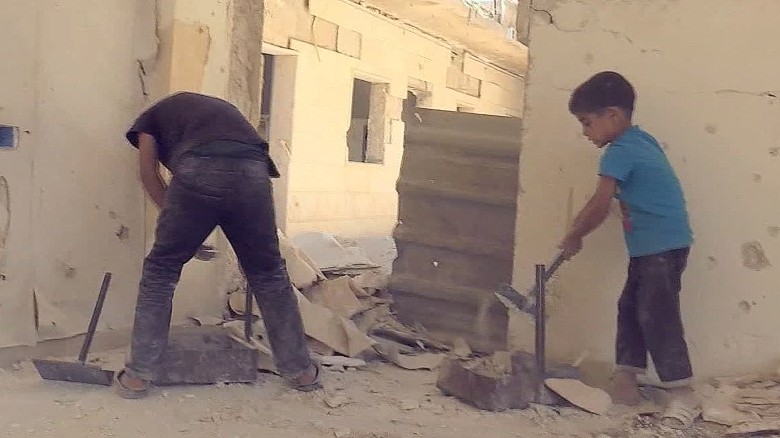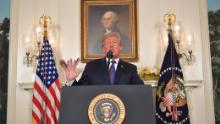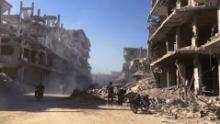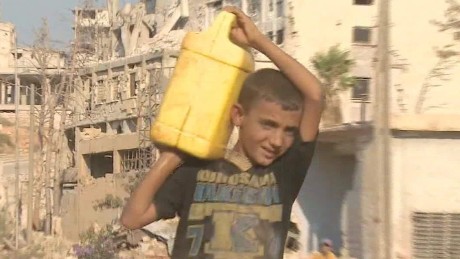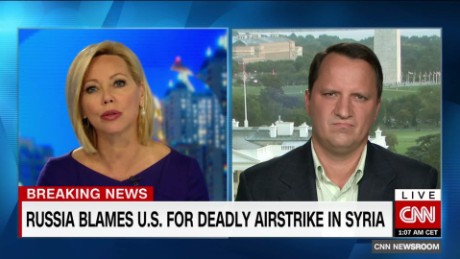Story highlights
- US/Russia relations soured by US-led airstrikes that killed regime troops
- War of words threatens co-operation via Joint Implementation Center
- Hopes of lasting peace after seven-day ceasefire seem dashed
(CNN)A week after Russia and the United States agreed a new cessation of hostilities in Syria, the deal is on life support.
A mistaken attack by coalition airpower that killed dozens of Syrian troops, as well as fresh airstrikes in Aleppo and Idlib, have led to bitter exchanges between Washington and Moscow.
Critical parts of the agreement remain unfulfilled.
The first five days following the introduction of the agreement provided merciful relief for Syrian civilians, especially the hundreds of thousands trapped in rebel-held areas of Aleppo. The UN envoy on Syria, Staffan de Mistura spoke hopefully of the Russian-American accord, reached in Geneva in September 10, as "a potential game-changer."
But then things started going badly wrong.
Read More
The essence of the deal, the details of which were never published, was this:
-- There should be seven consecutive days of reduced violence, during which the Syrian regime could only attack jihadist groups such as Jabhat Fateh al-Sham (the former al Qaeda affiliate) and ISIS.
-- During that period, aid should start to flow to Aleppo and five other parts of Syria in dire need of humanitarian supplies.
-- Once the US and Russia agreed that those seven days had brought significantly reduced violence, they would set up a Joint Implementation Center (JIC). Its role would be to coordinate strikes by both the US and Russia against militant groups, specifically ISIS and Jabhat Fateh al Sham.
A fraying agreement
There was an uptick in violence Friday, when the Syrian Observatory for Human Rights (SOHR) reported that four civilians were killed in airstrikes in Idlib, without identifying who carried them out. SOHR reported further airstrikes against Aleppo Sunday, which killed one woman.
Britain's Special Representative for Syria, Gareth Bayley, tweeted there were "credible reports of airstrikes on Aleppo, & barrel bomb attack" in the south. At the same time the Russian Defense Ministry said there was increasing shelling by rebels of government-held parts of Aleppo.
More damaging to the fragile agreement were the airstrikes carried out by US and Australian planes near the northern Syrian city of Deir Ezzor. Their targets were ISIS positions but they hit Syrian troops instead, causing heavy casualties. Dozens of soldiers were killed, according to the regime, which has been battling ISIS in Deir Ezzor for more than two years.
The incident led to accusations that were bitter even by the standards of the strained US-Russian relationship. Russia called an emergency session of the UN Security Council, only for US ambassador Samantha Power to describe the Russian move as "a stunt replete with moralism and grandstanding" that was "uniquely cynical and hypocritical."
Russian planes had joined the regime in hitting hospitals and refugee camps, she said, before going on to accuse the regime of "bombing in defiance of the Cessation of Hostilities."
Russia's ambassador to the UN, Vitaly Churkin, said that in more than 10 years at the UN he had "never seen such an extraordinary display of American heavy-handedness."
Beyond the rhetoric there were more telling comments from both diplomats.
Power said "Russia is not delivering on its end of the deal that we spent months negotiating in extremely technical detail," and "has to deliver the Assad regime, as in the course of the negotiations it assured us it would."
Asked whether the ceasefire was dead, Churkin said "This is a very big question mark." Asked about the suggestion from the Russian Foreign Ministry that the US was colluding with ISIS, he said: "One wonders."
It's difficult to imagine the JIC being a place of harmony in such circumstances.
No humanitarian aid
There was already finger-pointing over the failure to implement another key part of the agreement: getting humanitarian aid to half-a-dozen areas under siege, principally rebel-held parts of Aleppo. The UN has not been able to supply the area, where some 250,000 people are trapped, since early July.
The route into Aleppo from the Turkish border is yet to be declared safe. Part of the US-Russian plan is to demilitarize the area, according to a complex formula that measures the presence of rival groups to within a few hundred meters.
US officials stress there must be sustained humanitarian access to areas most in need before the next phase of the agreement can begin. But so far that hasn't happened, much to the exasperation of UN agencies which have convoys ready to roll into the worst affected areas.
There is no way to enforce the cessation on the ground, no way to hold parties accountable for breaking it and no way to guard aid corridors.
Rebel groups and the regime each suspect the other will exploit the pause to mobilize for new attacks or grab territory. In the absence of peacekeepers or monitors to hold neutral ground (no chance of that), there are few mechanisms for preventing such moves.
Moderates and terrorists
Part of the US-Russian agreement is that non-jihadist rebel groups in Syria must stop co-operating with and separate themselves from Jabhat Fateh or face untold consequences. But in many areas, including Aleppo and Deraa in the south, Jabhat Fateh is part of a broader rebel front that includes even elements of the Free Syrian Army.
If it's to be excluded from any deal, and then targeted once a period of sustained quiet occurs, Jabhat Fateh has no incentive to keep the peace - and every incentive to try to take territory while the cessation continues.
Separating Jabhat Fateh from other factions whose hatred of the regime is just as visceral will be difficult. The group has predictably claimed the "conspiracy" to break the "spirit of the revolution will increase the determination of the mujahid factions." Several other groups have also rejected the agreement.
Charles Lister, a Syria expert at the Mideast Institute who has extensive contacts with rebel groups, says that "many opposition figures see the US-Russia talks and whatever comes from them as a conspiracy against their long and hard fought-for revolution. It will be hard to change this mind-set."
Different aims
Ultimately, the US and Russia have fundamentally different goals in Syria. The Russians doggedly support Bashar al Assad, not because they think he's the best President for Syria but because they fear a complete meltdown of the state if he were to be removed. And Syria is one of the few states in the region still in Moscow's "sphere of influence."
US policy is to support "moderate" rebels and negotiate the removal of Assad, though who might replace him and how (the Assad dynasty doesn't accommodate alternatives) is a vexed question.
And it's not as though the US and Russia are the only players. Turkey, Iran, Saudi Arabia all have their proxies and enemies in Syria's multi-sided battlefield.
What if?
?... aid finally starts getting through, the fighting abates and the Russians and Americans decide there's too much to be lost in abandoning the fruits of all that negotiation?
UN envoy Staffan de Mistura will begin thinking about reconvening peace talks between the different parties -- though Jabhat Fateh would be excluded and many other rebel groups might also boycott the dialogue.
The incentive for Moscow is that its military involvement in Syria, which Russian officials predicted would last a few months, is still ongoing a year later. It has stabilized a tottering regime, but victory is not at hand.
The incentive for the US is that only Russia can coerce Assad into an agreement -- one that might (stress, might) ultimately involve his relinquishing power.
Those goals seem as distant as ever, even as progress is made against ISIS.
There was more than a note of exasperation in US Secretary of State John Kerry's remarks Sunday when he demanded the global community show it "can end this seemingly endless sense of deterioration and chaos" in Syria.
